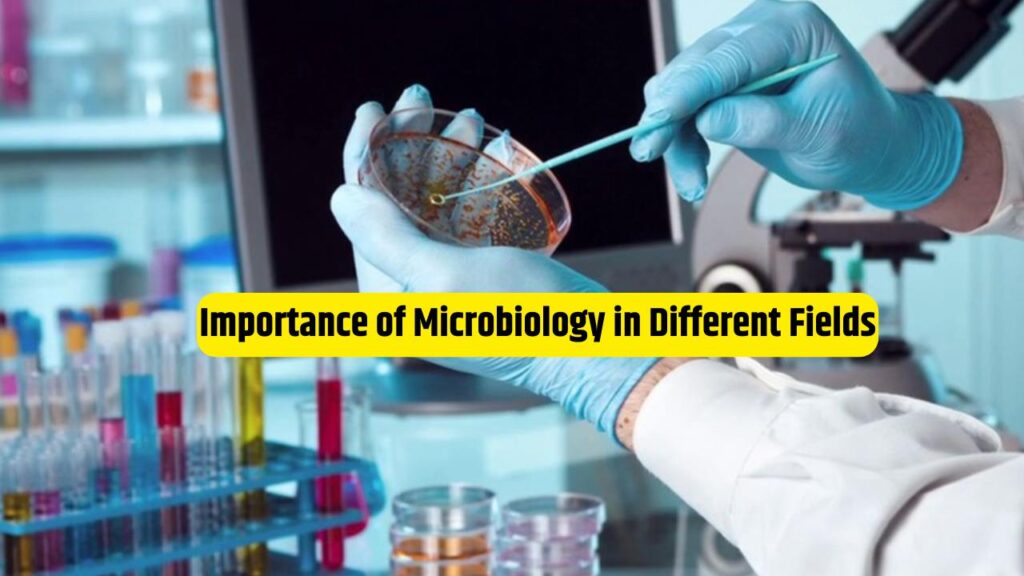Microbiology, the scientific study of microbes, It plays an role across various industries due to its involvement with microscopic organisms that are integral to our daily lives {Importance of Microbiology in Different Fields}
This field is concerned with understanding the biochemical and genetic makeup of these organisms, which has applications in food production, health, agriculture, environmental safety, and more..

So in this post we will check Importance of Microbiology in Different Fields…
Contents
- Importance of Microbiology in Different Fields
- Food Industry
- Health Industry
- Agricultural Industry
- Biofuel Industry
- Mining Industry
- Water Industry
- Cosmetic Industry
- Environmental Safety
- Pharmaceutical and Medical Microbiology
- Industrial and Agricultural Microbiology
- Microbial Biotechnology
- Food and Dairy Microbiology
- Environmental Microbiology
Importance of Microbiology in Different Fields

Food Industry
Microorganisms are essential in the food industry for fermentation processes, such as in the production of dairy products, vinegar, and alcoholic beverages
They also contribute to food security by enhancing food production, which is vital in addressing global food insecurity and the impact of the COVID-19 pandemic on access to nutrients
Microbial-based solutions in agriculture can improve plant growth, increase resistance to pests and extreme weather, and are considered environmentally sustainable. Some systems can boost crop yields by around 15%, translating to a significant increase in food production.
Health Industry
In the health industry, microbiology is used to produce vaccines, antibiotics, enzymes, vitamins, amino acids, and steroids
It is crucial for disease prevention, the development of agrochemicals, and the preservation of the environment. Microbiology helps understand how microorganisms cause diseases and discover treatments, including the development of antibacterial medications.
Agricultural Industry
Microorganisms play a crucial role in agriculture by promoting plant growth, participating in the nitrogen cycle, and enhancing soil fertility. They are involved in processes like fermentation, food preservation, and probiotic production, which have substantial impacts on human health and environmental safety.
Biofuel Industry
In the biofuel industry, microbes are used for the generation of microbial biofuels, biohydrogen production, and biogas generation. They are also used to manufacture industrial chemical products like biomethane, ethanol, and biodiesel.
Mining Industry
Microorganisms are employed in the mining industry to extract important metals from low-grade ores, showcasing their versatility and importance in non-traditional fields.
Water Industry
In the water industry, microbiology is applied for biological wastewater treatment and water self-purification, helping to maintain clean water supplies.
Cosmetic Industry
The cosmetic industry benefits from the production of compounds with favorable effects, such as fatty acids, enzymes, peptides, vitamins, and pigments, all derived from microorganisms.
Environmental Safety
Environmental microbiology deals with the degradation of pollutants like oil and aromatic compounds, contributing to the ecological restoration of environments affected by contamination. It also plays a role in bioremediation, which is the use of microorganisms to remove hydrocarbons and organic compounds from sewage water.
Pharmaceutical and Medical Microbiology
Pharmaceutical microbiology involves the study of microbes related to the production of pharmaceuticals and the prevention of microbial contamination
Medical microbiology focuses on pathogenic microbes and their role in human illness, including microbial pathogenesis and epidemiology.
Industrial and Agricultural Microbiology
Industrial microbiology exploits microbes for industrial processes, such as fermentation and wastewater treatment
Agricultural microbiology focuses on microorganisms relevant to agriculture, including plant microbiology and soil microbiology
Microbial Biotechnology
Microbial biotechnology manipulates microorganisms at the genetic and molecular level to generate useful products, closely linked to the biotechnology industry
Food and Dairy Microbiology
Food microbiology studies microorganisms causing food spoilage and food-borne illness, while dairy microbiology is concerned with those producing foods through fermentation.
Also Read: What to do after completing BSC Nursing 2024- Best Courses
Environmental Microbiology
Environmental microbiology studies the function and diversity of microbes in natural environments, including microbial ecology and water microbiology.
We hope that with the help of this article you would have got information about Importance of Microbiology in Different Fields.
Friends, how did you like this post, please let us know in the comment section and if you have any questions, then feel free to ask us in the comment box. If you found this post useful please share it with others.